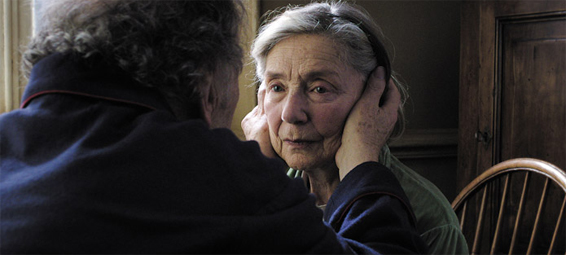Michael Haneke’s Amour opens with an invasion, the kind of dramatic event we almost expect at the start of a movie. A locked door is broken-in by a group of police officers who bust into the quite Parisian apartment. A detective flings opens doors to empty rooms, while an officer wrenches open a window to let out a bad smell. The smell, our gut tells us, is the stench of death, and what we have in these opening scenes is the making of a mystery. There’s a dead body, a mysteriously vacant apartment, a detective ready to investigate.
Amour is a mystery story, but of an altogether different kind then the one we expect from this opening scene. The first scene is a little movie wink from Haneke, but also a metaphor which only takes shape when we stay with the film all the way through to its last scene. Sticking with Amour is not easy, at least compared to most movies, but not because Amour isn’t a deeply engrossing and compellingly directed and acted film. It is difficult because the mystery at play is the great mystery of our lives and the very subject we must all confront and yet feel so ill-equipped to do so: death.
The film flashes back after its opening to re-introduce the apartment and its characters. Georges (Jean-Louis Trintignant) and his wife Anne (Emmanuelle Riva) are a couple in their eighties whose quiet, domesticated, and deeply habitual life has settled into the floorboards of the apartment. Save a few brief scenes, Haneke’s entire film takes place in this setting, typical of the director who is often interested incarceration. Here, however, the sense of claustrophobia from the setting is set against the focus and intimacy that is achieved by the singular setting. As Amour unfolds, we – and Georges – begin to see that Anne’s health is deteriorating. She is dying, and Georges’ life becomes consumed in her care.
As the title suggests, Amour is a film about love, and yet it approaches its subject with a great depth of compassion and nuance. “You are a monster,” Anne tells Georges early on in reference to his fits of rage or some brutal behavior. It is difficult to think of a more necessary line in the movie, a line that so starkly frames the reality of the relationship, the great complexity of emotions and history that runs beneath the surface. Much of what we learn about these two characters come through hints like this, little lines of dialogue, small gestures, facial expressions, or the long silences that pervade Haneke’s gravely-paced movie. Most of what we actually see is more mundane. Anne’s slow degradation renders her, like most old people, childlike. We watch Georges feed her mushed food with a spoon, change her diapers, and strain to decipher her speech.
In Amour, absence is presented as a gradual slipping away. Georges sits in his living room watching Anne play the piano. Haneke cuts back to a shot that frames the entire man sitting in his easy chair, a stereo system behind him. He turns, switches off the stereo, and we know the vision at the piano is gone. What remains is the woman in the other room, whose failing body is slowly, bit-by-bit rendering her just that: a body.
This scene is also typical of Haneke’s style, which creates moments that are plain – just right there in front of us – and haunted. Simple shots can suddenly become dreams and hallucinations that blend reality and the subconscious, the present and the beyond in a way that feels in debt to Roman Polanski. Other scenes are reminiscent of a filmmaker like Ozu, as when Georges finds a bird that has flown in through an open window in the apartment during a rain storm. We just watch the bird flutter around the hall to the sound of the pattering rain and, like George, stand transfixed. It is as if the unexpected moment yearns for a kind of meaning. It provides meaning, and it doesn’t; this scene is everything and a trifle.
Love is one of the movies’ raw materials, as it is for much storytelling, but movies’ typically dwell on the romantic or the sentimental, the ecstatic or the erotic. Here, Haneke’s vision of love is one that decries sentimentality. It is a love that is borne and suffered, conflicted and hot-forged like steel. It is not always kind, it can be violent, but it is loyal, determined, and deeply compassionate. It is remarkable that such a simply rendered, quiet film can prove this unshakeable. That pigeon in the foyer returns, and Georges catches it with a blanket, the bird trembling as he clutches it with his hands. Like so many moments in Amour, in the context of broader story, it is an arresting, mysterious, and deeply emotional image. That image holds us, and we find it hard to shake free.




